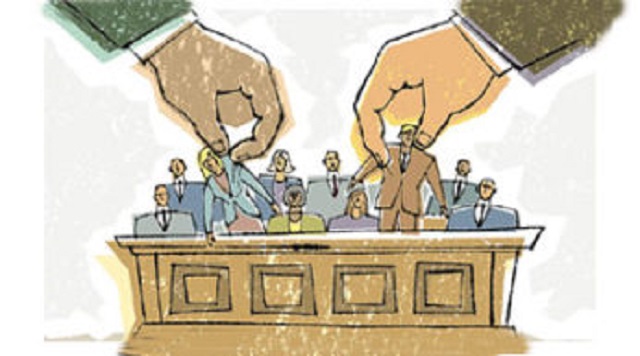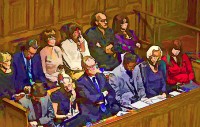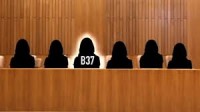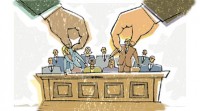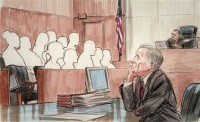
Manning v. State (Nev. Supreme Ct. – May 07, 2015)
A man entered the ABC Beer and Wine Store in Las Vegas where Potente was working. Potente recognized the man because she had seen him in the store two to three times before. During one of his prior visits, he spoke to Potente about selling either DVDs or CDs. When the man robbed the store, Potente stated that he looked around the store and then proceeded around the counter to where she stood behind the cash register. According to Potente, the man roughly pushed her aside and went to a set of plastic drawers where the store kept gaming money and receipts in envelopes, he took an envelope, and he then left the store. The robbery took approximately one minute to complete.
Three days after the incident, a responding officer returned to the convenience store with a six-person photo lineup. The officer showed Potente the lineup and asked her if she saw anyone in it that she recognized. Potente promptly identified Manning as the individual who came into the store that day and took the envelope. Manning was arrested after police discussed the case with Schafer, who was acquainted with Manning. The State subsequently charged Manning with burglary, battery with intent to commit a crime with a victim 60 years of age or older, and robbery with a victim 60 years of age or older.
The case proceeded to trial. The jury retired for deliberations late in the day and, about an hour later, gave the court a note indicating that it was deadlocked 10-2 in favor of conviction. The court instructed the marshal to tell the jury to come back the next day and continue deliberating. The court failed to inform the parties of the note until the next day after the jury returned its verdict finding Manning guilty of all charges.
After receiving the verdict and learning of the jury’s note that it was deadlocked, Manning filed a motion for a new trial. Manning argued that a new trial was warranted because he did not receive notice that the jury considered itself deadlocked, thus depriving him of his right to request a mistrial. The court denied the motion because the jury’s note did not contain a question about law or evidence.
The district court entered a judgment of conviction, sentencing Manning to six to 15 years in the Nevada Department of Corrections. Manning appealed.
The Nevada Supreme Court noted that the Ninth Circuit has determined that a district court’s failure to notify defense counsel about a jury’s inquiry during deliberations violates the defendant’s constitutional right to counsel during a critical stage of trial. See Musladin v. Lamarque, 555 F.3d 830, 840-43 (9th Cir. 2009). Accordingly, the presence of both the defendant and his or her counsel is required when discussing questions from the jury because counsel might object to the instruction or may suggest an alternative manner of stating the message, a critical opportunity given the great weight that jurors give a judge’s words. The defendant’s or attorney’s presence may also be an important opportunity to try and persuade the judge to respond.
Thus, the Court believed that due process gives a defendant the right to be present when a judge communicates to the jury, whether directly or via his or her marshal or other staff. A defendant also has the right to have his or her attorney present to provide input in crafting the court’s response to a jury’s inquiry. The Court held that a court violates a defendant’s due process rights when it fails to notify and confer with the parties after receiving a note from the jury. Therefore, the Court concluded that the district court erred in this regard in Manning’s case.
The Court also held that when a district court responds to a note from the jury without notifying the parties or counsel or seeking input on the response, the error will be reviewed to determine if it was harmless beyond a reasonable doubt.
The Court concluded that the district court’s error was harmless beyond a reasonable doubt. In this case, at the end of the day, after only a little more than an hour of deliberations, the jury’s note informed the district court that it was deadlocked 10-2. In response, the district court told the marshal to excuse the jury for the day and instruct them to return the next day to continue deliberations. The message that the district court instructed the marshal to give to the jury was simple and did not contain any legal instructions. Although the district court should have reconvened the proceedings and, on the record, discussed the jury’s note and conferred with counsel in developing a response, the Court did not believe that the result here would have been substantively different had it done so. It was unlikely that after only an hour of deliberations, the district court would have proffered additional instructions to the jury or required the jurors to continue deliberating past 5 p.m. Moreover, the Court believed that the district court correctly directed its marshal to excuse the jury and tell them to return the next day to continue deliberating. It was unlikely that the marshal would have altered this simple instruction in any meaningful or prejudicial manner. Therefore, the Court concluded that this error did not warrant reversal.


